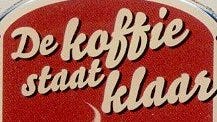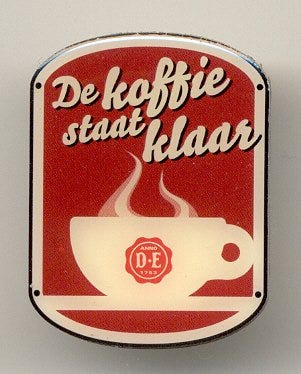A happy new year of depravity
An unfortunate accident in the garage leads me to Houthalen-Helchteren, the Scottish New Year and The Gambia
My lodger’s a bit mad at me – I knocked his towering glory of a tool chest over with the car and got his handbooks out of alphabetical order. I am a linguist and am only too aware that alphabetical order is vitally important in a dictionary. He inadvertently put a door he was painting in the way of my car and, as I backed into the garage, making sure I didn’t hit his washing machine, I hit the door, which was overhanging too far, and, over went his tool chest and also my Horten lamp, which I bought in Düsseldorf in 1990 and was treasured by me – I had repaired it twice and he’d put it down in the basement because he didn’t need it. It was all nobody’s fault and it was all both of our faults. We hugged.
I should be translating a companies register extract and, instead, I’m writing this, because I think, right now, this is more important. One day, when I can afford it, I’ll replace his broken tool chest and maybe he’ll replace my Horten lamp. Tool chests and lamps are not that important in the end; friendship is, and that’s not broken. And I’ll put some steam on tomorrow, to make sure the companies register extract is ready to be delivered on Monday.
Kurt suffered burnout and it’s a throw-away term that’s not always appreciated. Like a fuse burns out, you just pop another one in and away you go. Well, when a person’s fuse burns out, popping one in to replace it isn’t that easy. I know, and it makes me doubly sorry for being clumsy and breaking his tool chest. Because order is important to Kurt, and disorder is something I’ve learned to cope with. There’s a balance in there somewhere.
We talked tonight about Houthalen-Helchteren, a town in Flanders, which I described as “an entrance to hell”. The town is at a major crossroads between Holland to the north and Holland and Germany to the east, Antwerp to the west. A major road crossing making access easy to many interesting places. It’s near the E313 Antwerp road, which is notoriously the most dangerous motorway in Belgium and is as straight as a die. More dangerous than the crazy motorways that twist and turn through the Ardennes. I wonder why?
Recently, a sawmill in Houthalen-Helchteren was held up by an armed gang. As they forced everyone onto the floor, they broke through to a concealed cigarette factory at the back of the mill: it was the fags, not the lumber they were after. One employee had nipped out for a pee and came back in, saw what was going on and called the police, who also then discovered the cigarette factory and its hundreds of thousands of coffin nails, and had quite a few questions to put to the owners. The town is notorious for its right-wing gangs, as a place of sojourn in World War II for Adolf Hitler, for poor, working-class residents and a general aura of down-at-heeledness; a café was held up there a few years ago, also at gunpoint. There are two rival cafés at the crossroads to Pelt – one had a sign that said “The coffee is ready” and the other answered with “The coffee is made fresh once you take your seat”. There is much antagonism in Houthalen-Helchteren, and those who prefer to stay aloof from all that now traverse the town in a new tunnel that speeds their passage and reduces the danger of a drive-by.
Why do people drive so fast, so crazy along the long, straight E313? And under what influence do they do so? Nearby to Houthalen-Helchteren is a place called Kasteel Engelhof (Angel’s Court Castle) – also for balance, I reckon. However, the ease of ish and exit offered by Houthalen-Helchteren doesn’t necessarily mean that everyone who lives there has contraband in their cars.
What has Kurt got to do with Houthalen-Helchteren? Nothing, except this idea of balance. The idea that where there is skulduggery, there are angels. That where there is order, there is disorder. And where there is work there is holiday.
I recently wrote (Vincent's law) that the need for holidays was rendered redundant by the invention of the electric lightbulb, since feasts and festivals previously needed to be organised in daytime, but artificial light turns night-time into daytime. In the past, a day needed to be cleared in the calendar for such events, at which all took part. New Year in Scotland is a two-day event, with both 1 and 2 January earmarked as holidays. People joke about the amount of alcohol drunk by the Scots at Hogmanay, but the tradition has nothing to do with whisky, it has everything to do with the fact that Scotland was previously prohibited from celebrating Christmas by the English; denied one holiday, they just added a second day to the other and claimed it for their own. English warship … That’s also balance.
However, it can also be argued that the need for holidays was in fact doubled as a result of inventing the lightbulb, not done away with. Both are in fact true. The need for public holidays is outmoded - people do what they like instead of gathering together; but the need for “two weeks off” is great, because we make night into day in our work lives.
It is the electric lightbulb that means people need holidays at all, and it is a yearning to discover the world that forms our excuse to want two weeks off in the summer, though many go to rape the world of its natural resources and make war on it. We go across oceans to steal other people’s possessions, like the gangs of Houthalen-Helchteren tear up and down the E313, high on drugs and armed to the teeth with AK-47s. While they slam on meth, we slam our front doors and go and dump our plastic knives and plates on beaches and sit by pools under searing heat that peels our skin, and ignore the oppressed citizens who look on from the street, tongues hanging with hungered poverty, in forlorn places like The Gambia, one of whose citizens is begging me to help his impoverished lot in that far-flung land. Some who go there care, like friends of mine did. But many return home by jetliner and burn more lightbulbs into long nights, wearing themselves out for the next “global discovery”. Yes, that’s balance as well. And we make sure that the riches we pile high on one side of the scales are just as evenly offset by the poverty we impose on the other pan. We scorn cigarette forgers and drug runners who work the day round, but in fact don’t do much by anyone’s lightbulb. Just where do we purchase these high-minded principles that make us so pure of spirit and mind?
No wonder we drink ourselves silly to welcome in new years of depravity. We need to - for balance.




